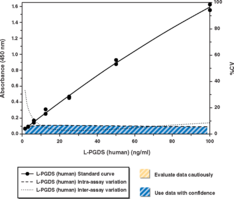Territorial Availability: Available through Bertin Technologies only in France
- Correlated keywords
- EIAs ELISAs Assays sandwich immunometric homodimer glycosylation catalyzes prostaglandins PGH2 PGD2 carrier proteins lipid-like molecules neurochemistry retinoids thyroid hormones body fluids cerebrospinal seminal plasma PTGDS beta-trace b-trace .beta.-trace betatrace btrace lpgds l-pgds assays
- Product Overview:
Prostaglandin D synthase (PGDS) catalyzes the isomerization of PGH2 to produce PGD2, a potent lipid mediator involved in sleep regulation, nociception, platelet aggregation, and allergic and inflammatory responses. Lipocalin-type PGDS (a.k.a. ?-trace) is a homodimer with each subunit ranging in size from 20-31 kDa, depending on the extent of glycosylation. L-PGDS has two functions: it catalyzes the conversion of PGH2 to PGD2 and acts as a carrier protein for lipid-like molecules (i.e., retinoids and thyroid hormones).{13130} L-PGDS is present in a variety of body fluids including cerebrospinal fluid, seminal fluid, and plasma. Cayman’s L-PGDS (human) ELISA is an immunometric (i.e., sandwich) ELISA with a standard curve ranging from 1.56-100 ng/ml and a limit of detection of 1.56 ng/ml. Inter- and intra-assay CV’s of less than 15% may be achieved at most concentrations. This assay has been validated using cerebrospinal fluid which contains approximately 12-30 µg/ml of L-PGDS.
Cayman Chemical’s mission is to help make research possible by supplying scientists worldwide with the basic research tools necessary for advancing human and animal health. Our utmost commitment to healthcare researchers is to offer the highest quality products with an affordable pricing policy.
Our scientists are experts in the synthesis, purification, and characterization of biochemicals ranging from small drug-like heterocycles to complex biolipids, fatty acids, and many others. We are also highly skilled in all aspects of assay and antibody development, protein expression, crystallization, and structure determination.
Over the past thirty years, Cayman developed a deep knowledge base in lipid biochemistry, including research involving the arachidonic acid cascade, inositol phosphates, and cannabinoids. This knowledge enabled the production of reagents of exceptional quality for cancer, oxidative injury, epigenetics, neuroscience, inflammation, metabolism, and many additional lines of research.
Our organic and analytical chemists specialize in the rapid development of manufacturing processes and analytical methods to carry out clinical and commercial GMP-API production. Pre-clinical drug discovery efforts are currently underway in the areas of bone restoration and repair, muscular dystrophy, oncology, and inflammation. A separate group of Ph.D.-level scientists are dedicated to offering Hit-to-Lead Discovery and Profiling Services for epigenetic targets. Our knowledgeable chemists can be contracted to perform complete sample analysis for analytes measured by the majority of our assays. We also offer a wide range of analytical services using LC-MS/MS, HPLC, GC, and many other techniques.
Accreditations
ISO/IEC 17025:2005
ISO Guide 34:2009
Cayman is a leader in the field of emerging drugs of abuse, providing high-purity Schedule I-V Controlled Substances to federally-licensed laboratories and qualified academic research institutions for forensic analyses. We are certified by ACLASS Accreditation Services with dual accreditation to ISO/IEC 17025:2005 and ISO Guide 34:2009.





